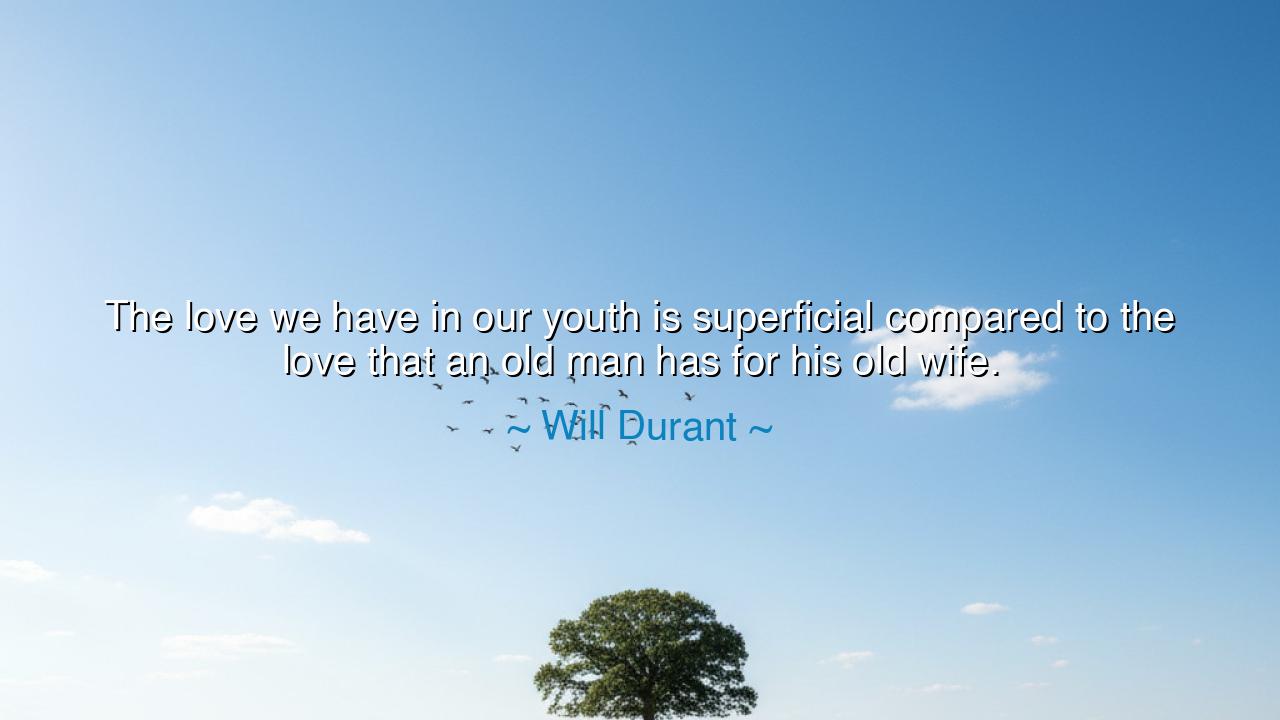
The love we have in our youth is superficial compared to the love
The love we have in our youth is superficial compared to the love that an old man has for his old wife.






Will Durant, the philosopher and historian, captures a timeless truth in his words: “The love we have in our youth is superficial compared to the love that an old man has for his old wife.” These words, simple yet profound, speak to the deepening nature of love as it matures and endures the test of time. The love of youth, though passionate and vibrant, is often marked by the fire of infatuation—a love that is quick to burn, intense and fleeting. But the love of an old man for his old wife, Durant reminds us, is something far deeper. It is a love that has weathered the seasons of life, a love rooted not in fleeting attraction, but in shared history, mutual respect, and the unspoken bond of companionship.
In the ancient world, the wise ones knew that true love is not something that comes easily or quickly, but something that is built over the long course of a shared life. Plato spoke of love as a pursuit of the soul’s deepest truths, a journey that evolves from the love of physical beauty to the love of the soul itself. Similarly, Aristotle described love as an enduring friendship between souls, one that is strengthened by time, hardship, and the experiences shared together. The love of youth, while full of passion, often lacks this depth. It is a love born of physical attraction, excitement, and the thrill of newness. Yet, over time, this love matures into something richer—something that connects the heart and soul in ways that transcend the surface.
Consider, O children, the story of Odysseus and Penelope, whose love is one of the most enduring tales in history. Though separated by war, Odysseus’ return to his wife was not just a return to youthful love; it was a return to the profound, abiding love that had been built over twenty years. Their relationship was not based on the excitement of new love, but on a deep mutual respect, a shared understanding, and a devotion that had withstood the test of time. Penelope, waiting for her husband through the trials of his long absence, and Odysseus, longing to return to her, shared a love that had deepened in their years apart. This love, not superficial, but solidified in their experiences and patience, stands as a monument to the power of time and commitment.
The same truth is seen in the lives of many couples who have spent decades together. Their love, though perhaps quieter and less flashy than the passions of youth, is rooted in the soil of shared memories, sacrifices, and a mutual understanding that only comes through years of togetherness. Consider the couple that has weathered the trials of life—sickness, hardship, and loss—and yet their love persists, not because of the flame of youth, but because of the deep affection and care they have cultivated for each other over time. True love, as Durant so wisely points out, becomes richer as it matures, for it is no longer about the superficial attraction, but about the soul’s bond, the intertwining of two lives that have been shaped together.
Durant’s words also highlight the wisdom of age—how, as we grow older, we come to understand that love is not about the excitement of the first kiss or the rush of the initial encounter. It is about the deep companionship that comes with time. The love of youth is often full of expectations and ideals, yet the love of age is tempered by reality, by patience, and by the quiet understanding that love is not something that needs to be constantly renewed or proven. It simply is. The old man’s love for his old wife is not about grand gestures or passionate declarations, but about the small, daily acts of care, the steady presence, the knowing glances, and the hands that have held each other through years of change.
The lesson here is clear, O children: love deepens with time, and it is in the shared life, the shared experiences, and the weathered hardships that true love is found. Youthful love is important—it teaches us to feel, to desire, to give. But the love that endures, the love that sustains us through the trials of life, is one that grows from these early passions into something far more profound. It is a love that is rooted in companionship, understanding, and the ability to grow together. To truly love, we must be willing to commit, to build a life together, and to allow that life to shape and refine our hearts.
In your own lives, cultivate love with patience. Do not seek to rush through life’s relationships or expect them to remain as they were in their youth. Understand that true love is not about the intensity of the initial spark, but the endurance of the flame that burns through the years. Let your love be built on the quiet, steady bond of shared experience and mutual respect. And know that, as the years pass, love can grow deeper and more beautiful than you ever imagined. For in the end, the love that is most cherished is the love that has stood the test of time.






AAdministratorAdministrator
Welcome, honored guests. Please leave a comment, we will respond soon